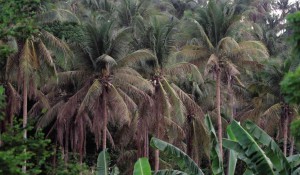DAVAO CITY, Philippines—The Philippine Coconut Administration (PCA) erred big-time when it failed to seriously look into the then developing coconut scale insect (CSI) or “cocolisap” infestation after it was first detected in 2009, militant lawmakers said.
Bayan Muna Representatives Neri Colmenares and Carlos Zarate last week filed House Resolution No. 1235 seeking a congressional inquiry into the scourge of what is scientifically known as Aspidiotus rigidus in the country.
A copy of the resolution was e-mailed to the Inquirer on Saturday.
Quoting a report from University of the Philippines Los Baños (UPLB) scientists Celia Medina and Barbara Caoili, Colmenares and Zarate said the specific species first monitored in Batangas in 2009 was the same species that earlier attacked coconut trees on Sangi Island in Indonesia.
The lawmakers said the Department of Agriculture’s Regional Crop Protection Center had then already noted how fast the scale insects were moving when they were first detected in Barangay (village) Ulango in Tanauan City.
“By 2010, the infestation had spread to three other barangays, namely, Natatatas, Santor and Balele,” Colmenares and Zarate said in the resolution.
They said that even back then, the UPLB scientists had called for “a need to study the cause of the pest outbreak and the development of control measures.”
However, Colmenares and Zarate said, the PCA did little—or even nothing—to contain the infestation.
It could have been easily controlled then, they added.
“The current widespread problem of CSI could have been prevented five years ago if only the government, led by the Philippine Coconut Authority, paid serious attention to reports of the initial infestation,” the lawmakers said.
The CSI infestation has greatly affected the livelihood of many farmers and is endangering the coconut industry, they said.
By May this year, the infestation had become so massive that a total of 1,084,531 coconut trees had been affected in Cavite, Laguna, Batangas, Quezon and Basilan.
Colmenares and Zarate said damage from the infestation—which has so far affected 3.5 million coconut farmers—has reached P179.6 million in Calabarzon alone. The problem continues to threaten 338 million coconut trees in other regions.
They said the infestation had become so massive that the government’s recent moves, such as the release of P400 million to PCA as support against CSI, “are almost futile measures.”
President Aquino issued an order on June 5 directing emergency measures to control the spread of and the damage caused by the pest, with the PCA as the lead agency. A total of P400 million was set aside for the endeavor.
But the lawmakers said the coconut farmers were only given “reactive and stop-gap measures,” such as leaf pruning, the cutting of infected trees, the application of organic pesticides and use of biological control agents.
“These are almost futile measures as early detection and identification of the pest are crucial in mitigating the problem. Physical methods such as leaf pruning can only be effective if done before an actual outbreak happens. Aside from the difficulty of applying pesticides for very tall plants, introducing predators or biological control agents are just short-term solutions to a serious problem of infestation,” they said.
They further said the PCA’s release of 24,000 coccinellid beetles, natural predators to the coconut pests, was not enough because the areas these covered were already heavily infested.
The PCA said it had embarked on such measures as biological control, pruning of leaves of affected trees and injection of neonicotinoids, a new type of insecticide similar to nicotine.
The use of neonicotinoids did not sit well with farmers’ groups even as many of them continued to oppose its use due to its alleged negative effects, including the poisoning of the xylem and phloem of trees.
The two lawmakers maintained that these, along with leaf pruning, were reactive measures that came too late.
They said PCA could have acted much earlier.
“If not for the blatant neglect of the PCA and DA under the Aquino administration, the CSI infestation would not have caused such damage as it does now,” the lawmakers said in the resolution.
